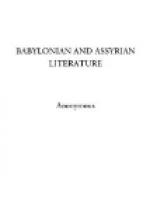Surpass the godly bond. O let me, king,
Rest on thy breast, and happiness will cling
To all the blissful days which shall be thine.
With glory of the skies, my love shall shine.
O Izdubar, my king! this love below
Is grander here than mortals e’er can know,
For this I leave my throne in yonder skies,
And at the feet of love thy queen now lies.
Oh, let me taste with thee the sweets of love,
And I my love for thee will grandly prove,
And thou shalt ride upon a diamond car,
Lined with pure gold; and jeweled horns of war
Shall stud it round like rays of Samas’ fire.
Rich gifts whate’er my lover shall desire,
Thy word shall bring to thee, my Sar-dan-nu!
Lo! all the wealth that gods above can view,
I bring to thee with its exhaustless store.
Oh, come my love! within the halls, where more
Than I have named is found, all, all is thine;
Oh, come with me within our halls divine!
Amid the fragrant odors of the pines,
And all shrubs and flowers, vines,
Euphrates’ zir-ri there shall sing for thee,
And dance around thy feet with zi-mu-ri[7]
And kings and lords and princes I will bring
To bow to thee, beloved, glorious king!
With tribute from the mountains and the plains,
As offerings to thee. Thy flocks shall twins
Bring forth; and herds of fattened, lowing kine
Shall fast increase upon the plains divine.
Thy warrior steeds shall prance with flowing manes,
Resistless with thy chariot on the plain.
Vast spoils, thy beasts of burden far shall bear,
Unrivaled then shall be my king of war;
And victory o’er all, thine eyes shall view,
And loud acclaims shall rend the bright Samu.”
[Footnote 1: “Kip-rat arba,” the four races or regions.]
[Footnote 2: “Bar-ili,” from “bar,” gate, and “ili,” of the gods—Babel, Bab—originates from the Accadian word “bar,” Semitic “bab;” thus Babel was originally called “bar-ili.” See Taylor and Furst. The latter renders it “Bar-(Bir-)Bel,” “town of Belus.”]
[Footnote 3: “Izzu-bar-ili” we believe to be the original name of Izdubar, afterward shortened to Izdubar, and means literally the fire-king of “bar-ili,” or the “fire-king of the gate of the gods.” This identifies him with Nimrod, the founder of Bar-bet or Babylon.]
[Footnote 4: Ka-ding-ir-a (Acc.), “gate of God”—Pinches.]
[Footnote 5: “Ner-kalli,” or “Ner-ekalli,” chief of the palace.]
[Footnote 6: “I-gi-gi,” pronounced “e-gee-gee,” spirits of heaven.]
[Footnote 7: “Zi-mu-ri,” spirits of the light.]
COLUMN II
THE KING’S ANSWER AND ISHTAR’S RAGE
Amazed the sovereign sat upon his throne; And while
she wooed, his heart was turned to stone;
In scorn replied:




